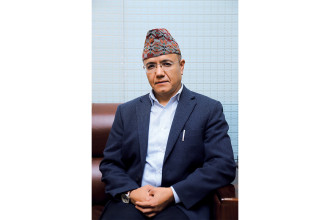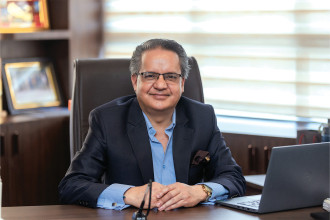-1723794027-(1)-1724145976.jpg)
Mohan Ojha, with a career spanning 37 years, has held key roles in various corporate organisations. His journey began from ground up, working at the Khetan Group of Industries in Nepal for 15 years, followed by a five-year tenure at the Chaudhary Group of Industries worldwide, where he served as HR/Admin and Corporate Affairs Head.
After nearly two decades in the corporate world, Ojha recognised the challenges faced by the human resources (HR) sector. Driven by a desire to strengthen HR practices, he founded Growth Sellers, a comprehensive HR solutions provider, in 2008. Ojha is also the founder of Growth Leadership Academy, and Corporate Club Nepal. Additionally, he is the President of Management Association of Nepal since 2023, an organization that works to actively shape the country’s management landscape.
Ojha’s commitment extends beyond business. He actively advocates for the skilling, upskilling, and reskilling of Nepal’s human resources. As a Founder Member and Past President of the Human Resource Society Nepal, he continues to champion excellence in HR management. Furthermore, he serves as the Founder/President of the Federation of Outsourcing and Staffing Institution Nepal, a role he has held since 2017. His influence also reaches the international stage as a Council Member of the Asian Association of Management Organisations since 2017.
In the issue of Business 360, we spoke to Ojha about what leadership means to him. Excerpts:
As someone who has been in various reputed positions, how do you define leadership? What are a few qualities that are necessary to become a good leader?
Leadership is basically the ability of an individual, group or organisation to lead, influence or guide other individuals, teams or entire organisations. Some of the qualities a leader must possess are they should be collaborative, persuasive and have good decision-making skills. A leader must also be able to orient the team, organisation or group to the right path. I believe in collaboration and team work; a leader must be able to take the team together and gain trust. A leader must also have to think for the greater benefit of the organisation and team. They should have strong determination, high morale and integrity, and attitude towards making a contribution for the greater benefit of the society and organisation.
Is leadership ‘inborn’ or ‘acquired’?
I believe leadership is basically acquired. Leadership is often cultivated through experience. When faced with challenges, confidence and leadership skills naturally develop. Conversely, excessive comfort and overprotection can hinder leadership growth and willingness to lead. Effective leaders possess the ability to find solutions even in difficult situations. Their qualities – such as experience, learning and determination – are shaped by family, society and interactions with diverse individuals. However, upbringing and social environment significantly influence one’s inclination to become a leader.
One incident that tested your leadership ability and how did you handle it?
I believe I have the ability to lead teams, societies and organisations. Throughout my journey - from being a classroom mentor to participating in various forums - I have consistently prioritised the collective success and objectives of leadership over personal glorification. When an organisation achieves success through the ongoing efforts of both the leader and the team, that success equally benefits everyone involved. I have not only established and led organisations under favourable conditions but also transformed struggling institutions into stable entities, ensuring effective succession planning for future leadership.
I am a very down-to-earth person and always feel good when I am in the middle of people. I am flexible but at the same time very consistent in my efforts to achieve my goal. I have always believed in my conscience and not done anything against it. I have had to face significant losses but I have never compromised with my ethics; if something is wrong, I will say so. That has become my identity and attitude in my personal and professional life in the long run”
When should a leader pass on the baton?
One of the major qualities of a leader is developing successors. Whether it is a public entity or a private company, effective succession planning is a must for the sustainability and growth of the institution.
How can one win over or influence people?
As a leader, I must be able to influence people with my work. I am hardworking and determined. I take my responsibility seriously and always think for the greater benefit of the organisation. I am always cautious towards the position I hold and focus on delivery with high integrity. I also honour the position I have taken and try to always prove myself. The best way to win over people is through actions.
How can a leader prepare for the unknown?
A leader sometimes has to take prompt decisions. However, a leader should be consultative to the extent possible. Leadership is all about taking on challenges. While dealing with a challenge a leader must think wisely, and with a pious objective and a positive mindset. A leader must also possess good analysing capacity. There will be times when things might go wrong despite doing it with a good intention. These are the times when a leader should not be hesitant or reluctant to correct their decision.
What leadership style do you follow?
I follow a flexible leadership. I feel a leader should be flexible, consultative, collaborative and have a problem-solving attitude to the extent circumstances allow.
Is there any leader you look up to?
There are many leaders I draw inspiration from but if I have to name a person then it would be Dr Sanduk Ruit who has established a globally acclaimed eye hospital with state-of-the-art facilities. The ophthalmic lenses that Tilganga Institute of Ophthalmology exports are renowned globally. Coming from a humble background, Dr Ruit has placed Nepal in the global map of ophthalmology care.
The other person I look up to is Dr Bhagawan Koirala, who has led various institutions such as the Shahid Gangalal National Heart Centre and Institute of Medicine, TUTH where he has done an astounding job. Currently, he is involved in establishing a hospital for children. Dr Koirala had all the opportunities to settle down and make a career abroad but he chose to return and service his country. I believe Dr Ruit and Dr Koirala are the people who everybody should look up to.
How important is a team for a leader?
A team is always important for leader. Leadership drives a team for effective delivery. Without a team, a leader cannot do much. Whatever a leader delivers is ultimately a collective effort of the team.
Have you faced any failure and what did you learn from it?
I have encountered many failures in life but I have learned valuable lessons from those failures. They have made me strong, resilient and helped me find the right way in my life and the right domain in my career. The learnings from the failures and mistakes are unparallel to others. The failures that I faced as an entrepreneur have taught me several lessons for life and I am now conscious about not repeating those mistakes. I have learnt not to make random decisions; any decision that one makes should be based on evidence. I started a grocery store which failed, and then I started a showroom selling shoes and that too failed. I even left my job at the university. But now I have realised I am a people’s person and have achieved success in the human resources domain.
What aspects of your personality have helped you to serve various roles in the past?
I am a very down-to-earth person and always feel good when I am in the middle of people. I am flexible but at the same time very consistent in my efforts to achieve my goal. I have always believed in my conscience and not done anything against it. I have had to face significant losses but I have never compromised with my ethics; if something is wrong, I will say so. That has become my identity and attitude in my personal and professional life in the long run. In my opinion, the success of people can be measured by how satisfied they are with the job they are doing. The job you do as a leader must have meaningful reflection in the society.






